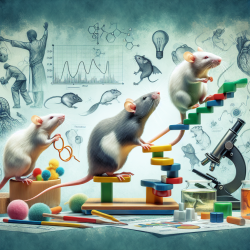Unlock the Secrets of Rett Syndrome: What This New Rat Model Reveals!
As a Special Education Director, staying informed about the latest research is crucial for providing the best support to our students. A recent study titled "MeCP2 deficiency results in robust Rett-like behavioural and motor deficits in male and female rats" offers groundbreaking insights that could enhance our understanding and intervention strategies for Rett Syndrome (RTT).
Understanding Rett Syndrome and MeCP2
Rett Syndrome is a severe neurodevelopmental disorder primarily affecting females, caused by mutations in the MECP2 gene. This disorder is characterized by normal early development followed by a loss of acquired skills, motor abnormalities, and cognitive decline. The MECP2 gene plays a crucial role in brain development, and its deficiency leads to the symptoms observed in RTT.
The Novel Rat Model: A Game Changer
The study introduces a novel rat model that mirrors the behavioral and motor deficits seen in RTT. Unlike traditional mouse models, this rat model offers distinct advantages due to the larger size of rats, which facilitates more detailed anatomical and physiological studies. This model shows significant abnormalities in growth, motor function, and behavior, providing a comprehensive platform for understanding RTT's early mechanisms.
Key Findings and Implications
- Early Onset of Symptoms: Male rats showed symptoms as early as postnatal day 21, with severe progression leading to early mortality. Female rats displayed a more gradual disease course.
- Reduced Brain Weight: Both male and female rats exhibited reduced brain weight early in development, indicating significant neurological impact.
- Motor and Breathing Abnormalities: The study identified early motor deficits and breathing irregularities, crucial for developing timely interventions.
How Practitioners Can Benefit
For practitioners, this research highlights the importance of early detection and intervention in RTT. By understanding the developmental timeline of symptoms, therapists can tailor interventions to address specific deficits as they arise. Moreover, the rat model provides a valuable tool for testing new therapeutic approaches that could be translated into clinical practice.
Encouraging Further Research
This study opens new avenues for research into RTT and similar neurodevelopmental disorders. By leveraging this rat model, researchers can explore the underlying genetic and environmental factors contributing to RTT. This could lead to breakthroughs in treatment options, ultimately improving the quality of life for individuals affected by this disorder.
To read the original research paper, please follow this link: MeCP2 deficiency results in robust Rett-like behavioural and motor deficits in male and female rats.










